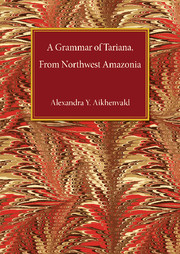Book contents
- Frontmatter
- Dedication
- Contents
- List of tables, schemes and diagrams
- Preface
- Acknowledgements
- Organisation and cross-referencing
- List of abbreviations
- Map
- 1 The language and its speakers
- 2 Phonology
- 3 Word classes
- 4 Nominal morphology and noun structure
- 5 Noun classes and classifiers
- 6 Possession
- 7 Case marking and grammatical relations
- 8 Number
- 9 Further nominal categories
- 10 Derivation and compounding
- 11 Closed word classes
- 12 Verb classes and predicate structure
- 13 Valency changing and argument rearranging mechanisms
- 14 Tense and evidentiality
- 15 Aspect, Aktionsart and degree
- 16 Mood and modality
- 17 Negation
- 18 Serial verb constructions and verb compounding
- 19 Complex predicates
- 20 Participles and nominalisations
- 21 Clause types and other syntactic issues
- 22 Subordinate clauses and clause linking
- 23 Relative clauses
- 24 Complement clauses
- 25 Discourse organisation
- 26 Issues in etymology and semantics
- Appendix. The main features of the Tariana dialects
- Texts
- Vocabulary
- References
- Index of authors, languages and subjects
11 - Closed word classes
Published online by Cambridge University Press: 05 August 2013
- Frontmatter
- Dedication
- Contents
- List of tables, schemes and diagrams
- Preface
- Acknowledgements
- Organisation and cross-referencing
- List of abbreviations
- Map
- 1 The language and its speakers
- 2 Phonology
- 3 Word classes
- 4 Nominal morphology and noun structure
- 5 Noun classes and classifiers
- 6 Possession
- 7 Case marking and grammatical relations
- 8 Number
- 9 Further nominal categories
- 10 Derivation and compounding
- 11 Closed word classes
- 12 Verb classes and predicate structure
- 13 Valency changing and argument rearranging mechanisms
- 14 Tense and evidentiality
- 15 Aspect, Aktionsart and degree
- 16 Mood and modality
- 17 Negation
- 18 Serial verb constructions and verb compounding
- 19 Complex predicates
- 20 Participles and nominalisations
- 21 Clause types and other syntactic issues
- 22 Subordinate clauses and clause linking
- 23 Relative clauses
- 24 Complement clauses
- 25 Discourse organisation
- 26 Issues in etymology and semantics
- Appendix. The main features of the Tariana dialects
- Texts
- Vocabulary
- References
- Index of authors, languages and subjects
Summary
In this chapter we consider closed word classes which share some properties with nouns but do not take the full range of noun morphology discussed in Chapters 5-10. This justifies their recognition as separate classes. Most of them can be used as heads of NPs, as modifiers and as arguments; however, they differ in the amount of noun morphology they can take.
Personal pronouns are discussed in §11.1. The other closed classes are specifier articles (§11.2), demonstratives (§11.3), interrogative-distributive kwa (§11.4), gestural deictic khi (§11.5), distributive individualiser napada (§11.6), general indefinite pa:-(also used as numeral ‘one’) (§11.7), numerals (§11.8), quantifiers (§11.9). All these classes are similar to nouns in that they can be used as modifiers and as the head of a noun phrase. Connectives (§11.10) cannot be used as modifiers; they can function as arguments, and as nominal derivational bases. Table 11.1 summarises the morphosyntactic properties of closed classes which can be used as modifiers and as heads in attributive NPs considered in §§11.1-11.10. Restrictions on the co-occurrence of modifiers from closed classes in a noun phrase are considered in Chapter 21.
Adpositions (§11.11) are a closed word class historically derived from various subclasses of nouns, and of verbs. They can only be used as NP heads, and take little noun morphology: they are subdivided into a number of classes depending on the amount of noun morphology they take. Adpositions (§11.11) are used as heads of possessive NPs.
- Type
- Chapter
- Information
- A Grammar of Tariana, from Northwest Amazonia , pp. 203 - 233Publisher: Cambridge University PressPrint publication year: 2003

